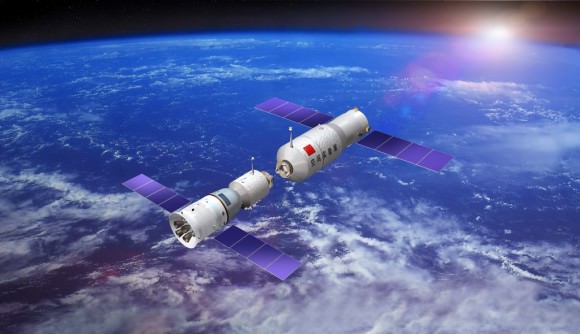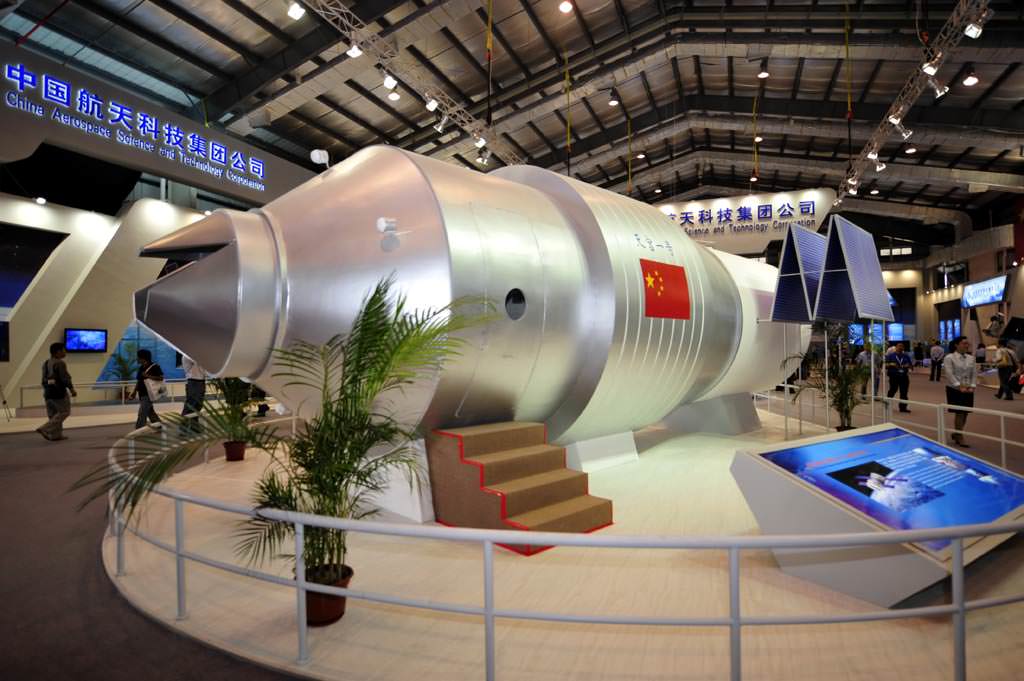[/caption]
China’s space program is in the news again, this time with unconfirmed reports that the Tiangong 1 space lab may be launching into orbit sometime this year – possibly later this month. Previous news reports cited potential launch dates in 2010 or 2011, so this launch isn’t too far behind schedule.
What plans does China have for their first orbital space station prototype?
The space lab, named “Tiangong” translates from Mandarin Chinese into English as “Heavenly Palace”. Weighing just under 9 tons, the prototype module will orbit for two years. China will use the module to practice docking maneuvers and test orbital technologies during the module’s lifetime.
China plans to follow the Tiangong 1 orbital lab with two more lab launches over the next few years to continue testing systems and technologies before starting construction on their own space station in the 2020’s. Based on China’s current plans, the Tiangong orbital labs will not be used in the Chinese space station.

Many space analysts believe China’s lack of a perceived “space race” is a potential reason for the country’s slow, methodical space program build-up. So far, China has only launched three manned space flights: Shenzhou 5 and Shenzhou 6 ( 2003 and 2005, respectively). China’s first mission to include a spacewalk was Shenzhou 7 (2008).
While China is making great strides with their manned space program, there are no current plans to include China in the ongoing International Space Station project. Despite several political and technological issues preventing China’s participation in the ISS, recent comments from officials at the China National Space Administration have indicated a willingness to allow other countries to visit the country’s space station once it is operational.
If you’d like to learn more, Universe Today has previous coverage (Jan. 2010) on the Tiangong mission at: http://www.universetoday.com/51506/china-to-launch-space-station-in-2010-or-2011.
You can also visit the China National Space Administration’s website at: http://www.cnsa.gov.cn/n615709/cindex.html


ARRRGH!……After our great efforts in the 60’s and 70’s, we’re now getting skunked by the Commies. If our stupid government would stop having wars with everyone, we could use our money for something useful – like space exploration.
Guess who owns 26.1% of the US debt?
http://en.wikipedia.org/wiki/United_States_public_debt#Foreign_holders_of_U.S._Treasury_Securities
Since we and our Canadian, European, and Russian partners already have a 100 meter long space station in orbit, how is it that we are being skunked by anyone? I don’t get it.
I think it is great the China has decided that space is important avenue of scientific research, and I for one salute their efforts.
I still don’t trust them buggers, and I still use my 2 mile deep digging detectors. There not gonna sneak up on my town!!
I can probably come up with a few obvious ones, but can anyone highlight the actual reasons that China cannot participate in the ISS?
The U.S government passed a resolution banning NASA from cooperating with the Chinese space agency. There’s been evidence of industrial espionage by China, along with many cases of stolen civilian and military secrets.
One other hurdle is that the docking ports on China’s Shenzhou craft aren’t mechanically compatible with the ISS.
Personally, I’d love to see as many space-faring nations participate in joint efforts, but there’s a lot of diplomatic work to be done between the U.S and China before it can happen.
“A system compatible with APAS is used by the Chinese Shenzhou spacecraft making it possible for that spacecraft to dock with the ISS.“
Can you point to documentation (other than wikipedia) for that? Everything I’ve been exposed to has shown that Shenzhou isn’t compatible with the ISS.
The U.S government passed a resolution banning NASA from cooperating with the Chinese space agency. There’s been evidence of industrial espionage by China, along with many cases of stolen civilian and military secrets.
One other hurdle is that the docking ports on China’s Shenzhou craft aren’t mechanically compatible with the ISS.
Personally, I’d love to see as many space-faring nations participate in joint efforts, but there’s a lot of diplomatic work to be done between the U.S and China before it can happen.